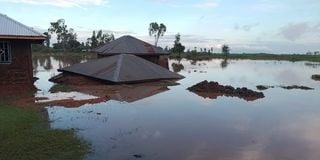Have better disaster response system, not reactive Band-Aid

Houses submerged in flood waters in Kobala, Rachuonyo North sub-County on April 11,2024.
The flooding in various parts of the country is quite alarming, even as some people blame Mother Nature for our own mistakes and greed. Global warming may have something to do with flooding but human actions and greed have played bigger part in the catastrophe.
Many are really perplexed at the level of flooding in Nairobi and its environs. But there is no reason to be puzzled; the chickens are coming home to roost. Effects of years of poor planning, neglect of the environment and unsustainable development are beginning to register.
Better get used to the situation since this is likely to be the new norm. These floods have not yet claimed lives in a big scale but it’s only a matter of time. We are reaping where we have so carelessly sowed; sleepwalking down a road to assured destruction.
In an ideal situation, the arrival of the rainy season should portend good news to farmers. However, this year, it’s a harbinger of gloom and doom.
Over the past few years, we have experienced severe floods and other natural disasters. But too often, the response by the national and county governments to these disasters has been chaotic and reactive. The floods have killed many people and destroyed property worth millions of shillings.
The changes in the climate and weather patterns are constant. Adequate awareness and preparation is now urgently needed for the unexpected but the planning should, like the weather pattern, be constant. While having mechanisms for urgent fixes to address unexpected tragedies is vital, it is worth exploring more long-term ideas and planning better response to disasters, especially floods that are increasingly becoming a perennial problem in the country.
Floods In the yesteryears and recent tragedies like fire and cholera outbreaks in the slums due to torrential rain have consistently proved disastrously how we are always caught off-guard, precisely because we have failed to learn from our past mistakes and get things right.
The government should think of solving the massive housing problem, especially in and around places such as Budalang’i and Narok and cities like Nairobi that have been experiencing this menace.
It is unwise to limit the effects of floods to displacement of people. Heavy rains and flooding has consistently destroyed crops, which disrupts food production and, ultimately, causes food shortages and hunger. The government must prioritise disaster risk reduction in its plans and allocate funds to emergency response as lack of funding greatly impedes quick response in terms timely delivery of aid to the victims.
With the country facing grave disaster threats such as hunger amid a depressed economy mainly due to Covid-19, the government should put measures in place to help victims of flooding.
It should also carve a sustainable flood management strategy for the nation and enforce it. For example, there should be a map available on the internet where one can check which areas are environmentally sensitive with restriction on construction, else we perish.
- Mr Onyango is an advocate of High Court of Kenya. [email protected].




